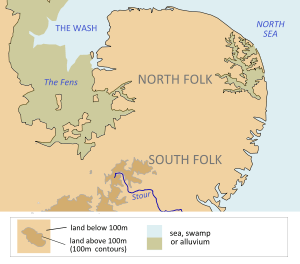Wuffingas
The Wuffingas, Uffingas or Wuffings were the ruling dynasty of East Anglia, the long-lived Anglo-Saxon kingdom which today includes the English counties of Norfolk and Suffolk. The Wuffingas took their name from Wuffa, an early East Anglian king. Nothing is known of the members of the dynasty before Rædwald, who ruled from about 599 to c.624. The Viking invasions of the ninth century destroyed the monasteries in East Anglia where many documents relating to the rule of the Wuffingas would have been kept.

The last of the Wuffingas kings was Ælfwald, who died in 749: he was succeeded by kings whose lineage is unknown.
Family tree
The following family tree includes the Wuffingas kings from Wehha to Ælfwald. They are numbered in order of ruling.[1] Ecgric of East Anglia was also a member of the Wuffingas house, but his exact descent is not decided. He may have been Sigeberht's brother, or his step-brother.
| Wehha1 | |||||||||||||||||||||||||||||||||||||||||||||||||||||||||||||||||||||||||||
| Wuffa2 | |||||||||||||||||||||||||||||||||||||||||||||||||||||||||||||||||||||||||||
| Tytila3 | |||||||||||||||||||||||||||||||||||||||||||||||||||||||||||||||||||||||||||
| ? | Rædwald4 | ? | Eni | ? | |||||||||||||||||||||||||||||||||||||||||||||||||||||||||||||||||||||||
| Eorpwald5 | Rægenhere | Sigeberht6 | Anna7 | Saewara | Æthelhere8 | Æthelwold9 | Æthelric | Hereswitha | |||||||||||||||||||||||||||||||||||||||||||||||||||||||||||||||||||
| Seaxburh | Æthelthryth | Æthelburh | Jurmin | Ealdwulf10 | |||||||||||||||||||||||||||||||||||||||||||||||||||||||||||||||||||||||
| Ælfwald11 | |||||||||||||||||||||||||||||||||||||||||||||||||||||||||||||||||||||||||||
The kingdom of East Anglia was invaded by peoples from northern Europe during the 5th and 6th centuries. Historical sources relating to the genealogy of the East Anglian kings include the Anglo-Saxon Chronicle and Bede's Ecclesiastical History, both compiled many years after the kingdom was formed, as well as a pedigree of Ælfwald contained in the Anglian collection that dates from the 9th century. In the pedigree, Ælfwald is claimed to descend from the god Wōden.[2]
.png) | |
| Ancestor | |
|---|---|
| Ælfwald (Alfwold Aldwulfing) | |
| Ealdwulf (Aldwulf Æðelricing) | |
| Ethelric (Æþelric Ening) | |
| Eni (Eni Tytling) | |
| Tytla (Tytla Wuffing) | |
| Wuffa (Wuffa Wehhing) | |
| Wehha (Wehh Wilhelming) | |
| Wilhelm (Wilhelm Hrypping) | |
| Hryth (Hryp Hroðmunding) | |
| Hrothmund (Hroðmund Trigling) | |
| Trygil (Trygil Tytimaning) | |
| Tytiman (Tytiman Casericg) | |
| Caesar (Caser Wodning) | |
| Wōden (Woden Frealafing) | |
| Pedigree of Ælfwald from the Anglian collection, preserved in the Textus Roffensis | |
After 749, East Anglia was ruled either by the rulers of Mercia, or by kings whose genealogy is not known.
Cultural associations
The author Sam Newton has claimed that the poem Beowulf may have been composed during the reign of Ælfwald. Before the end of his rule, East Anglia contained a group of ecclesiastical centres, all of which had strong associations with the Wuffingas dynasty. These included the sees at Dommoc and Helmham, St. Botulph's monastery at Icanho, the religious foundations at Ely and Dereham founded by daughters of Anna, the minster at Blythburgh and the monastery founded by Sigeberht prior to his abdication and subsequent death in battle.[3]
After comparing Sutton Hoo with archaeological sites in Sweden, the archaeologist Sune Lindqvist suggested in 1948 that the Wuffingas may have been related to the Royal House of Uppsala, and so descended from Wiglaf.[4][5]
References
- Yorke 2002, p. 68.
- Newton 1993, p. 77.
- Newton 1993, pp. 133-4.
- Crawford 1948, p. 140.
- Chase 1997, pp. 6-7.
Bibliography
- Chase, Colin (1997). The Dating of Beowulf. University of Toronto Press. ISBN 978-0-8020-7879-7. Retrieved 30 November 2012.
- Crawford, Osbert Guy Stanhope (1948). "Sutton Hoo and Beowulf" by Sune Lindqvist". Antiquity. Antiquity Publications. 42: 140. Retrieved 30 November 2012.
- Newton, Sam (1993). The Origins of Beowulf and the Pre-Viking Kingdom of East Anglia. Cambridge: D. S. Brewer. ISBN 0-85991-472-0.
- Yorke, Barbara (2002). Kings and Kingdoms of Early Anglo-Saxon England. London and New York: Routledge. ISBN 0-415-16639-X.
Further reading
External links
- Dr Sam Newton's Wuffing Website
- William of Malmesbury's Chronicle of the Kings of England from the earliest period to the reign of King Stephen, Book 1, "Of the kings of the East Angles" in English and in Latin